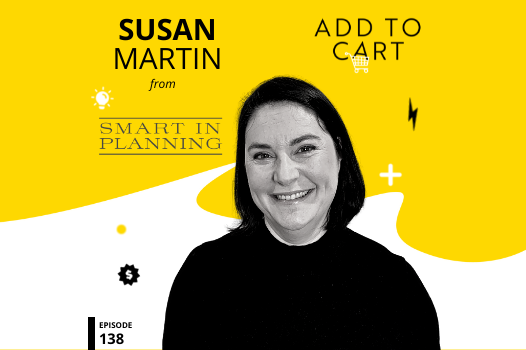In this episode of Add To Cart, we are joined by Susan Martin from Smart In Planning. Have you ever wondered what the hell Merchandise Planners do? They are like the air filters of the retail world – everyone knows they are important but most don’t know what they actually do. Susan Martin is not just a Merchandise Planner, but one of the best in the country with her experience at Cotton On, Best & Less and The Warehouse Group. Today, Susan is the CEO of Smart In Planning who consults leading retailers on how to optimise their inventory, and ultimately, their profitability. In this chat, we go deep into the world of stock and stock planning. We discuss, in detail, what a stock plan and forecast should actually look like – from an excel document right through to a specialised system. We also discuss the importance of planning even in uncertain times like we have today and why all retailers should be looking up to Con The Fruiterer as their inspiration.
“The control is actually what gives you freedom. The control is actually what puts you in a position to innovate or grow.”
Susan Martin
Questions answered in this episode include…
- What does a merchandise plan look like?
- What are the most important metrics that can show whether a business is running at a healthy inventory level?
- How does a business get started with merchandise planning if they don’t have anything in place currently?
Control = Freedom
“The merchandise plan, it’s both a strategic long range tool and it is also a short term in the now trading enabling kind of tool. But I like to think of it as a means to put you really in the driver’s seat so that you really get your bearings on the business.
Effectively most of what happens in merchandise planning, you’re looking at at some intersection of product, time, and location. And that can be a different levels. You can probably hear how excited I get when I talk about it, because it’s so much insight, it’s so much visibility, it’s so much control. And I know people sometimes get nervous when when I talk about control. Because I think there can be this connotation of planning being a bit of a killjoy and a bit too restrictive and that sort of thing.
But to me actually, there’s a funny little twist in that where the control is actually what gives you freedom. The control is actually what puts you in a position to innovate or grow. You can understand what’s going on through the control and the visibility that comes with that tool.”
The Freshness Factor
“I personally, I like to deal with a metric called freshness, which not everybody has come across. And when I first learned about freshness from somebody actually here in Australia, I was a little bit skeptical about it and I thought, “oh, I feel like you just made that up”.
But I used it where I was taught it, which was with the Warehouse Group when I was employed by them. And I don’t know, the lights came on for me a little bit with that metric and I’ve used it ever since. And any business where I’ve implemented planning, I’ve put in the freshness factor.
Effectively, it’s quite a simple little measure. It’s really looking at your receipts or your intake over the last three months as a ratio of your overall stock on hand. And so you just express that as a percentage. And there is a tipping point. I don’t want to quote numbers that people then take too literally, but a loose rule of thumb is a freshness factor over 80% would be considered healthy.
And if you think about what that really means, it’s pretty much saying the value of the stock that you receipted in the last three months represents 80% of what you’ve got on offer. And when you connect that through to other planning metrics like stock turn and sell through, you can see that it’s bang on with where those good efficiency levels would be.”
Think like a greengrocer
“Your stock needs to move. What’s actually more of a dirty word, I don’t know what the word is though, is having a standstill. So idle stock, that is probably the worst case scenario.
And again, that same, very clever person who taught me about freshness used to use this expression…it doesn’t matter whether or not you’re selling fruit, think of it like fruit. If you’re not moving it through quickly, it’s going to rot. It’s going to smell really bad. You want it to move and you want it going.”
Links from the episode:
This episode was brought to you by…





